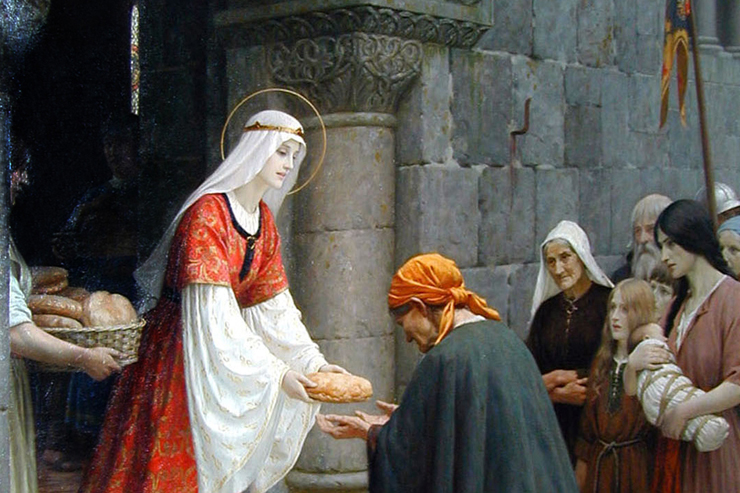 A closer look at “private property” and our obligations to others
A closer look at “private property” and our obligations to others
My young daughter Elizabeth has a favorite tee-shirt that boldly proclaims, “The Toddler Laws of Property”:
- If I like it, it’s mine;
- If it’s in my hand, it’s mine;
- If I had it a little while ago it’s mine;
- If it looks just like mine, it’s mine; and
- If I think it’s mine, it’s mine!
Fittingly, that shirt accurately depicts the way toddlers often treat things in their little world. Children most definitely have their own rules and ideas when it comes to possessing possessions.
Part of parenting then is to disciple our children to take notice of other children’s needs and to openly share. It’s a message that needs to be frequently delivered in a variety of forms as it cuts against a child’s natural inclination. Each of us is made in the image of a generous God, yet being generative is not innate.
As adults, we too, oftentimes struggle to live with a generative spirit. In fact, it is countercultural in our capitalistic society to be faithful to the message found in 1 Timothy 6:18-19: “Tell them to do good, to be rich in good works, to be generous, ready to share, thus accumulating as treasure a good foundation for the future, so as to win the life that is the true life.”
For the most part, private property is viewed as our property. Something to be accumulated, protected, and passed on to our immediate loved ones after we are gone. Even so, private property is far from sinful. In fact, private property acquired by just means is oftentimes a worthy endeavor that advances the common good.
The Good of Goods
Goods that are justly pursued by individuals out of self-interest can lead directly to the increased good of the larger society. Adam Smith long ago observed that an “invisible hand” often guided the unintended actions of individuals toward increased societal wealth.
In addition, the noble pursuit of capitalism through self-interest often yields more than unintended acts of service. A moral free market system can inspire many intended acts of beneficial service, where receiving money/private property as a result of extending constructive goods and services to our neighbors advances God’s creation. Unlike socialism and the community of goods, free market capitalism offers economic incentive to develop our God-given gifts and talents.
Goods and private property, after all, are not a bad thing. There is nothing holy about debt, or not being able to pay your bills, or an economy that cannot afford to manufacture and/or pay for goods. In many ways, we can financially serve the poor better by not allowing ourselves to join their ranks. Economically speaking, humanity is better served by helping to alleviate poverty rather than contributing to it.
Poverty is not a virtue. It has no intrinsic goodness. Only the motive behind poverty may be virtuous if the desire is to help remove the obstacles which stand in the way of working toward spiritual perfection. But goods and private property gained through just means can support a quite holy effort.
Rising standards of living can surely be in concert with the development of human dignity, solidarity, and human rights. It may be just as holy to expand and invest in an honorable business, which employs others and provides worthy goods and services, as it is to give to charitable endeavors.
Jesus’ message enlightens us that having money in our hands is not the problem; it is having money in our hearts. The reason why it is easier for a camel to go through the eye of a needle than for a rich man to enter the kingdom of God, is not because a man is materially rich. Rather, it is because the rich may find themselves to be more attached to material wealth than to God.
Unfortunately, when goods are viewed as “our private property” they tend to become our end instead of God. And when we understandably protect our private property from outsiders through security gates and alarm systems we may unknowingly help create a mindset where it becomes difficult to see that the sick, poor, and society’s so-called undesirables are our brothers and sisters too.
Goods have a Global Destination
Our faith instructs us that in the beginning God entrusted the earth and its resources to the common stewardship of mankind. The goods of creation are therefore destined for the whole human race and supersede our right to private property.
As stewards of providence and God’s trustee we ought not to regard material goods as solely our own, but as a universal resource that is to be shared when we see others in need. “If someone who has the riches of this world sees his brother in need and closes his heart to him, how does the love of God abide in him?” (1 Jn 3:17). Saint Ambrose put it this way, “You are not making a gift of your possessions to the poor person. You are handing over to him what is his. For what has been given in common for the use of all, you have arrogated to yourself. The world is given to all, and not only to the rich.”
At the end of our lives, we will not be judged by the amount of our private property or the goods we have garnered. When we are judged by God, it will be: “I was hungry and you gave me food; I was thirsty and you gave me drink; a stranger and you welcomed me; naked and you clothed me; ill and you cared for me; in prison and you visited me.” Matthew 25:35
Still, in these trying financial times our focus can easily become turned inward, where our goods and private property are held onto with a firm grasp. Solidarity for the poor can get swept aside over our own financial concerns. Therefore, it is especially during these turbulent economic times that we must be intentional about others in need and our obligations to them.
It is only through making a paradigm shift from “privately owned” to “God owned” that the “Toddler Laws of Property” can be prevailed over by our living out “God’s Law” regarding the global destination of goods. If we are to become rich in the true life that we are called to, what’s mine must also be yours.
We value your comments and encourage you to leave your thoughts below. Please share this article with others in your network. Thank you! – The Editors












